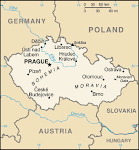
Not that the discontinued use of the Russian language in the post-Soviet countries is noteworthy news this day in age, but this article renewed a spark of interest in the degradation of its linguistic legacy. Latvia's president, Valdis Zatlers, has announced that he will refuse to use the Russian language with Russian journalists. Announced today, his decision coincides with an amendment approved by parliament last week that now raises fines for the use of nonofficial languages by employers and employees. Zatlers commented on his decision by declaring that "Latvia has only one state language and it is Latvian."
While the move has irked some human rights groups, it will undoubtedly have more of a diplomatic discommode for Russia. Russia's Foreign Ministry, on Saturday, has called the adoption of the amendments as verging on the "point of absurdity." Russia demands better Latvian treatment of ethnic Russians. One-third of Latvia's 2.2 million population already uses the Russian language. Pockets of ethnic minorities there use the former lingua franca of the Soviet Union, having yet to adapt the Latvian language.
This is part of a perpetual trend for former Soviet countries: abating the Russian language in lieu of national ethnic languages. It has held true for Estonian, Georgian, Polish, Latvian, and many others. When these countries individually reformed after the dissolution of the Soviet Union in 1991, they de-Russified themselves linguistically and culturally.
Zatlers is not unique in his move, but this action does serve as a reminder of Russia's precedent in the 2008 Russian-Georgian War: that Russia can still use its ethnic language as a tool against neighboring countries. What Zatlers has done may in the long-run ensure that none of his citizens will ever be manipulated as Georgia's ethnic Abkhaz and Ossetian populations have been.























No comments:
Post a Comment